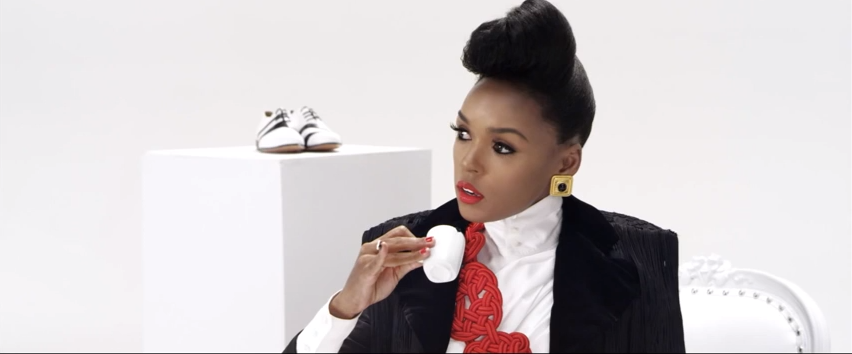Music
Video Vultures: Radical Empowerment

In Video Vultures, Cory Clifford takes a look at different music videos and ties them together through musical, political and cultural similarities.
Any song, whether it be a dubstep instrumental or a jukebox country classic, can provide a sense of empowerment. The way music moves people, and creates temporary weightlessness, is ultimately a perfect moment of escapism. The music video on the other hand is only empowering based on cinemagraphic narrative. From Mary J. Blige’s “No More Drama” to Poison’s “Every Rose Has Its Thorn,” these music videos feature an internal struggle throughout that can send you an emotional roller coaster, provided you fall for its intentions to do so. But then there are some music videos that wake you up. They brighten your eyes or provide you with a furled brow. It’s those music videos whose message isn’t just internal, but is a cultural colossus demanding to be a discussion point in modern conversation and history.
One of the earliest instances of such a video from my memory, was from one of my dad’s favorite bands of the 90s – Rage Against The Machine. Now RATM has always been controversial and a politically charged band, but the ultimate statement comes with their The Battle of Los Angeles single, “Guerilla Radio.”
The video opens up in a white infinite void, where obvious sweatshop workers are on display, while throughout the video, various clips of a model-like man and woman couple display an Eddie Bauer-esque sense of blithe ignorance. I remember watching the video as a kid, and thinking about how a few years earlier, my mother was tsking at the reporting of Nike’s infamous sweatshop scandal. Rage hit the nail on the head with this video, and to this day it still is all I picture whenever I hear the song. A few years later, nearly every rock band had a statement to make, in particular about former president George W. Bush.
Politics aside, one has to admit that the video for “Megalomaniac” by Incubus is an incredibly effective of display of impressive collage art that perpetrates the terror of tyranny, imperialism, and falseness in American icon worship. This politically charged video and song are an interesting and impressive display of the culture of fear that the first decade of the new millennium was all about. Looking back at this particular pop song, it’s incredibly daunting today, considering how relevant it still is to the war-mongering, secrecy and media-blindness that culmination of our ever-crumbling infrastructure. Fortunately, out of struggle, music tends to appear to be more aware, more daring and in many cases revolutionary. This certainly can be said about the music and music video for Janelle Monae & Erykah Badu’s new single “Q.U.E.E.N.”
But what’s particularly interesting about “Q.U.E.E.N.” is how subtly rebellious the entire video is. Everything is in black and white, which serves as a brilliant platform for the message of the song. Janelle and Erykah Badu (known in the video as “Badula Oblongata”) exist in a futuristic museum piece of rebels, where mini-references towards fashion expectations of men and women create this very eye-opening video experience, that many could miss, but those who don’t can be overwhelmingly impressed by. Lastly, the song is a huge statement, and in the last verse of it Janelle raps some serious truth in lines like “They keep us underground working hard for the greedy/But when it’s time pay they turn around and call us needy” and “Will you be electric sheep?/Electric ladies, will you sleep?/Or will you preach?” That last verse where goes really hard shows Janelle in this Bond-like light display, and one of the reasons it’s so real is because it shows Janelle in her uniform: a tuxedo. By simply wearing that tuxedo, Janelle shows her ability to be a queen and to escape the expectations of pop stardom, femininity, and African-American women.
Looking back at compilations like Rock Against Bush or Green Day’s American Idiot, and even some of Eminem’s political songs, some of these songs were so overtly angry that it seemed nauseating at times. Though Rage Against The Machine and Incubus were overt as well, there seemed to be a sense of “waking up” while sitting on your couch eating Cheetos and watching MTV music videos. Art pop on the other hand, well, it’s only recently starting to make a comeback, thanks to the previous decade’s massive influence of “indie” culture. Though Janelle Monae certainly isn’t the first of the modern era to strive for artistic-pop stardom, she’s definitely one of the most impressive. She’s like if Miles Davis had the pipes of Tina Turner and the lyrics of Q-Tip, and though she may not be quite on her way to something like In A Silent Way, “Q.U.E.E.N.” is definitely her first instant-classics, and its empowering message is the reason. Us “millennials” are brewing up some seriously impressive counter-culture, and though are society’s problems are far from over, radical music like the aforementioned, are ones to incite just enough empowerment to want to fix them.